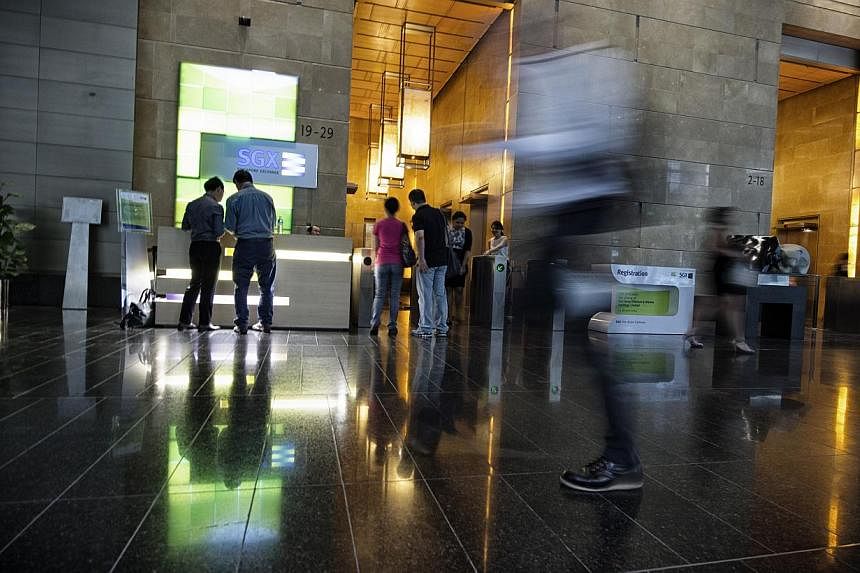THE stock market gets curiouser and curiouser - to borrow a phrase from Lewis Carroll's Alice In Wonderland.
The Singapore Exchange reported last week that more than 68,000 new Central Depository (CDP) accounts were opened in the past 12 months - the highest number of new accounts over a one-year period in its history.
It also said that interest is growing among people wanting to learn more about investing, with its education portal SGX My Gateway recording a 20 per cent jump in subscribers to 187,600 in the past year.
But all these glowing numbers have failed to translate into an upsurge in trading activity: Total stock market turnover for the first six months plunged by 34 per cent to just $136 billion compared with the same period last year.
Worse, the pace of decline appears to be accelerating. Last month, the average daily turnover plunged by 40 per cent to just under $1 billion from a year ago. Compared with May, the average daily turnover was down 16 per cent.
This is perplexing considering that other regional bourses are not faring as badly. In fact, Bursa Malaysia registered a 3.5 per cent gain in its first half's average daily turnover to RM2.06 billion (S$806 million).
Market operators have blamed the local stock market woes on a very sharp drop in retail participation.
Mr Barnaby Matthews, Singapore head of derivatives at Macquarie Securities, noted that retail interest is so low, "brokers tell us they are really hurting".
Trading in covered warrants - which used to be very popular among retail investors - fell so much that the first six months' turnover of $2.18 billion was even lower than the average monthly trades of $2.35 billion the warrant sector was recording at its peak in 2007.
Similarly, trading in exchange-traded funds (ETFs) - which buy into baskets of stocks, gold and other assets - has also fallen off a cliff. Turnover for the first half of the year plunged by half to just $1.08 billion, compared with last year.
Some blame the withdrawal of retail investors on their sheer frustration at being unable to make money in the Singapore stock market.
They observe that the past 15 years has been one big nightmare for retail investors as they lurched from one market calamity to the next - the 1998 Asian financial crisis, the dot.com bust in 2000 and the S-chip scandals after the global financial crisis in 2008.
For retail investors, the penny stock crash last October was the last straw, hurting many.
But this column has also noted the concern by some pundits that the stock market is suffering from the increased regulations that were put in place after investors suffered losses in products such as Lehman minibonds, which were ironically not traded on the bourse here.
Take the rule on specified investment products (SIP) which puts covered warrants and most ETFs out of reach for most retail investors.
It requires them to take a test before they can trade such products, unless they can show proof that they are financially literate.
The SIP rule has investors' interests at heart, but they find taking the test a big deterrent.
This, some say, helps to explain the disdain for warrants and ETFs here.
Now, the big worry is the push for collateralised trading, which has gained currency following last October's penny stock crash.
This is to replace the current practice where brokers offer up to three days' credit to their clients to settle outstanding purchases without having to put up any cash or collateral.
This column has long maintained that such an outmoded settlement system should not have a place in Singapore, given the outlandish risks brokers have to take as they have no access to their clients' finances and CDP accounts while they charge only a paltry commission on each trade.
Such a practice also tends to fuel the massive speculative trading observed each time the market turns frothy, as traders ride on the free credit provided by their brokers to make huge bets on their fancied counters.
But this column also recognises that trying to curb the excesses of contra trading by requiring traders to put up collateral may further stifle the retail investor's interest in the stock market.
As stock activist Mano Sabnani once pointed out, the occasional investor is not likely to want to leave cash idling with his broker. He will also prefer to keep his shares in the CDP, rather than leave them with his broker as collateral and incur costs for the arrangement.
And if he already has money in his Supplementary Retirement Scheme or Central Provident Fund investment account to invest, why should there be a need for him to put up collateral with his broker to buy stocks?
It is a dilemma that brokers hope to resolve by asking regulators to allow them to continue extending the credit scheme for trades below $50,000, so that the occasional investor is not tripped up by the new collateral requirement.
Otherwise, they fear that retail interest will die even more quickly once collateralised trading is implemented, and we may end up with a stock market devoid of small-time investors.
Is that just scaremongering? Hard to say. But the drastic drop in retail participation in our stock market is a very real worry.

